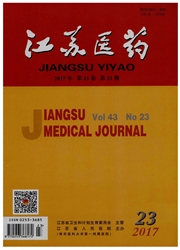

 中文摘要:
中文摘要:
目的探讨静息态脑功能低频振幅(ALFF)的变化评估有氧运动后阿尔茨海默病(AD)患者功能改善的价值。方法将42例AD患者随机均分为训练组和对照组。训练组采用踩脚踏车或以跑步机运动为有氧训练项目,以强度为50%-70%最大运动能力作为训练标准,每次训练持续60-90min(中途休息10min);共训练12周,每周训练3次。检测训练前和12周训练后的ALFF和简易精神状态检查表(MMSE)评分。结果训练后,训练组MMSE评分和ALFF值较训练前增高(P〈0.05);训练组前后两次ALFF差值大于对照组(P〈0.05)。ALFF值与MMSE评分无明显相关性。结论 ALFF可以作为AD患者有氧训练有效性评判的辅助指标。
 英文摘要:
英文摘要:
Objective To investigate the role of amplitude of low frequency fluctuation(ALFF) in the evaluation of efficacy of aerobic training in the patients with Alzheimerts disease(AD). Methods Forty-two AD patients were equally randomized into two groups of A(received aerobic training) and B (did not have aerobic training). Aerobic training in group A was performed at 50%-70% of maximal intensity lasted for 60-90 min, which was repeated three times per week for 12 weeks. The minimum mental state examination (MMSE) and ALFF were used to access the efficacy of aerobic training before and after 12 weeks. Results The MMSE scores and ALFF values in group A were significantly higher after training for 12 weeks than those before(P〈0. 05),the changes of ALFF were bigger in group A than those in group B(P〈0. 05). The MMSE scores were not significantly correlated to the ALFF values. Conclusion ALFF can be used in the evaluation of clinical efficacy of aerobic training in the patients with AD.
 同期刊论文项目
同期刊论文项目
 同项目期刊论文
同项目期刊论文
 期刊信息
期刊信息
